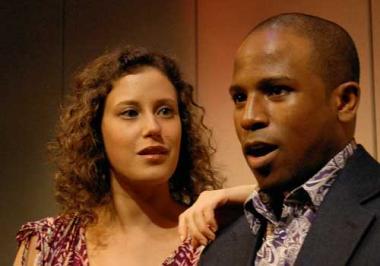One of the thrills of summer theater, for actors and audience alike, is its pressure-cooker schedule. The rehearsal period for each show is usually less than two weeks, challenging the actors to put together convincing performances without the luxury of extended character exploration. Audiences pick up on this adrenalized energy. If the performance isn't always as smooth or detailed as it could be, it's more than made up for by panache. And it's always a joy to see accomplished professionals having a great time plying their trade.
That's very much the case with two shows playing in the area through this weekend. Railroad Bill, a world premiere at the Chester Theatre Company, and Arcadia, a contemporary classic at New Century Theatre, are stocked with intriguing characters and brought to life by terrific casts. Both are plays of ideas whose twisting plotlines are punctuated by frequent laugh lines. And in both, the audience is usually a tantalizing step or two behind what's really going on.
The black Robin Hood
The Chester company, which started life as the Miniature Theatre of Chester, celebrates its 20th anniversary this season. The repertoire has gotten hipper over the years, under the artistic direction of Byam Stevens, and the theater's founding commitment to smart small-scale plays with big-time themes has only gotten stronger.
Playwright TJ Edwards is also an actor, and in Railroad Bill he's written four characters of the kind that make actors salivate just reading the script. There's big, brash Abe Isaac, a sort-of literary agent whose only interest in prose is its potential payoff. His new protege is Jesse, a young black man with ideals and scruples, both of which Abe vows to cure him of.
A young woman, Samantha, comes to the agency seeking a six-figure price for an old manuscript she owns: the journal of Railroad Bill, the train robber of the 1890s known as "the black Robin Hood." Completing the quartet gathered around the manuscript is Mr. Jones, who wants to acquire it for a foundation dedicated to African-American history and sees it as "an important link to our painful history." The play is a sharp satire on greedy commerce and an exuberantly un-PC examination of racial pride and prejudice, couched in a comedy-thriller format in which almost no one is quite what they seem to be.
Terry Alexander's Jones is a stiff, meticulous gentleman who takes himself, and his didactic pronouncements, way too seriously. He's a perfect foil for Charles Stransky's Abe, who is by turns smarmy, sarcastic, bullying and unapologetically unscrupulous. Melissa Miller is a chameleon Samantha—tough, wheedling, scheming and sexy as situations and opportunities require. As Jesse, the Candide of the piece, Warren Jackson is all eager sincerity as he tries to make good in a bad world.
David Towlun's spare, functional set serves for three different locations, all backed by a blindingly white back wall that perhaps evokes the sterility of the play's amoral maneuverings. Sound designer Tom Shread has provided amusingly eclectic incidental music, including folksongs about the real Railroad Bill.
Chaos in olde (and new) England
Arcadia is a bigger play than Railroad Bill, with a much larger cast, longer running time and themes that include the composition of the universe and the nature of time. Considered by many to be Tom Stoppard's masterpiece, it's one of his sly comedies whose plots embody ideas in modern physics and mathematics—in this case, chaos theory, entropy and fractal geometry.
It takes place in a drawing room of Sidley Park, an English country mansion, and unfolds in two different time periods, the early 19th century and the late 20th, first alternating and finally simultaneous. In the modern era, the central figures are three scholars seeking clues for their research into the doings of the household 180 years earlier. Meanwhile (so to speak) in 1809, the activities in question are being played out. The overlapping plotlines explore the collisions of Classical and Romantic ideals, rationality and intuition, determinism and chance, as well as the role of sex in upsetting the ordered clockwork of the universe.
Sam Rush's spirited production and his able cast illustrate the pleasures and compromises inherent in a nine-day rehearsal schedule. The actors, of necessity, play to their strengths and make bold-stroke character choices. This makes for some inconsistencies in style and tone, but the director expertly knits them together into a well-balanced whole.
Sadly, space doesn't allow me to applaud all 12 cast members individually. In the 19th-century household, I particularly enjoyed Lisa Rowe-Beddoe as the bustling, bossy lady of the estate; Shelby Leshine as her 13-year-old daughter Thomasina (though I wish we'd seen her mature more in the later scenes, when she's three years older and closer to the actress' actual age); and David Mason, amusingly bemused but perhaps a bit too diffident, as Thomasina's tutor and the key to most of the goings-on the moderns are trying to unravel.
The two most extravagant performances are by Keith Langsdale and Paul Melendy, both of them great physical comedians, in the present-day scenes. Langsdale is an enthusiastically dorky modern-day professor who believes he's discovered the reason for Lord Byron's abrupt departure from England in—that's right—1809. Melendy is fey and languid as a mathematician who discovers that Thomasina was a precocious genius who intuited 20th-century math.
Contrasting with these two is Cate Damon's nicely understated performance as reserved, rational Hannah, who is preoccupied by the 1809 conversion of the Sidley gardens from their stately, Versailles-style elegance into a Romantic faux-wilderness.
Rush, who staged Arcadia four years ago at Smith College, has invited Jaquelyn Marolt back to recreate the set she designed for him as a student. It features a parabolic back wall that gracefully reflects the plot's elliptical geometries.
Railroad Bill: Chester Theatre Company, 15 Middlefield Rd., Chester, through August 9, (413) 354-7771, www.chestertheatre.org.
Arcadia: New Century Theatre, Mendenhall Center, Smith College, Northampton, through August 8, (413) 585-3220, www.newcenturytheatre.org.



